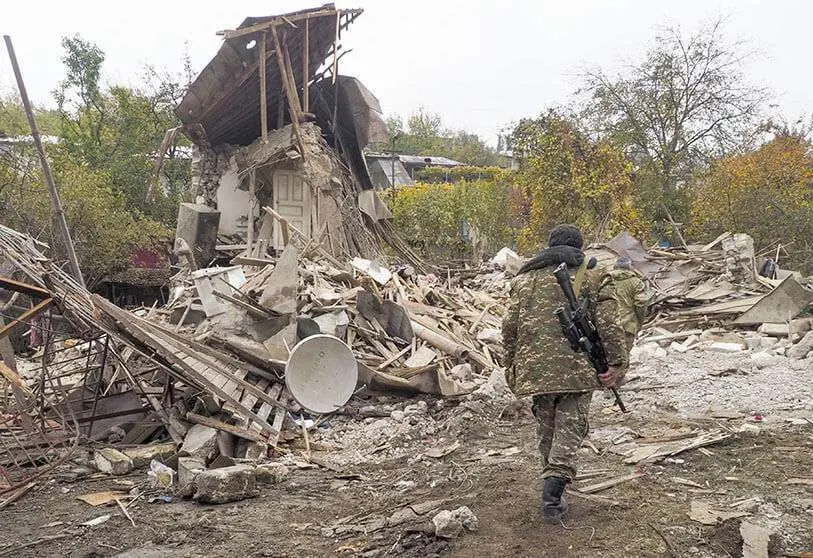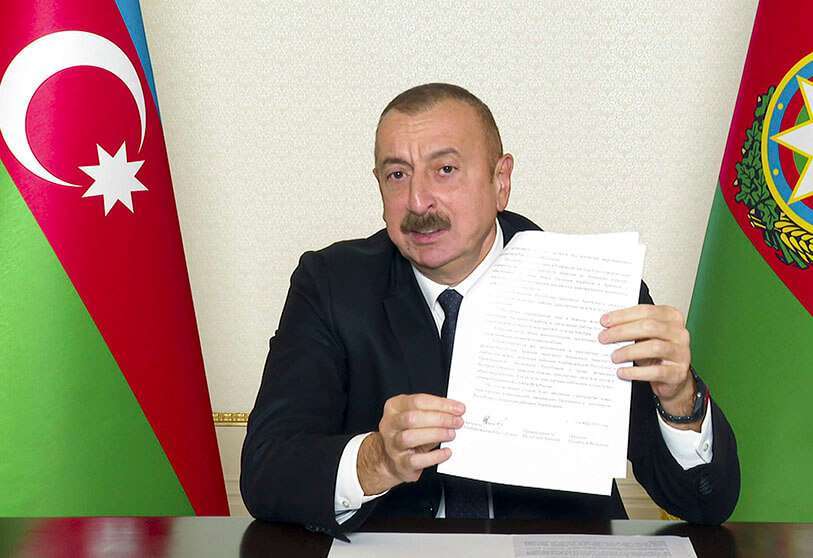Pashinián and Aliev sign a ceasefire and agree on negotiating lines in Nagorno-Karabakh

The fighting in Nagorno-Karabakh comes to a definitive end today. But will this latest ceasefire really be respected? From 9 p.m. onwards we will know the answer to this question. After a month and a half of fighting, Azerbaijan and Armenia have agreed to put an end to the war that has claimed thousands of civilian and military lives.
After many international calls to stop the fighting, the outbreak of violence has been stopped under Russia's mediation. Azerbaijani President Ilham Aliev and Armenian head of government Nikol Pashkin signed a declaration with Russian leader Vladimir Putin declaring a "complete cessation of fire and all hostilities" in the Nagorno-Karabakh conflict zone from 00:00 Moscow time Tuesday (2100 GMT Monday).
The Azeri army has advanced, with the support of Turkey, by "reconquering" all the territory of Nagorno-Karabakh formerly managed by Armenia. The ceasefire agreement has been sealed after Azerbaijan took Shushi, the second most important city in the territory, which is internationally recognised as part of Azerbaijan but populated by Armenians and de facto controlled by Armenia.

The Azeri armed forces have also taken control of Artsaj's capital, Stepanakert (called 'Jankendi' for Azerbaijan) which is 11 kilometres from Shushi. The loss of control of these two cities has led Armenia to consider a possible ceasefire and political negotiation. President Aliev had already warned on several occasions that he would "only stop the offensive if Armenia withdrew from the areas of Nagorno-Karabakh".
The Armenian President said that the signing of this ceasefire had been a "painful" agreement for him and said he had taken the decision for the good of the population. "The text of the declaration is very painful, personally for me and for our people. I made this decision after a thorough analysis of the military situation and an assessment of people who have a greater control of the situation, “said Pashinián.
Aliyev, for his part, declared that the agreement represents the “capitulation” of Armenia and also “the end of the military phase of the conflict.” In his words, “we are now going to the political solution phase” of the dispute. What is not known is whether this time the political negotiations will be successful or whether they will stagnate as in 1994.

From Moscow, the Russian president specified that the agreement provides for both parties to remain in the positions they currently occupy while a Russian peacekeeping contingent is deployed on the line of contact in Nagorno-Karabakh and along the corridor connecting the separatist enclave with Armenia.
In total, according to the Defense Ministry, Russia will send 1,960 military personnel, 90 armed vehicles and 380 car units and special equipment to the Karabakh. The first Il-76 military transport aircraft have already departed from Ulyanovsk airport. Aliyev also said Turkey, which has supported Baku in the conflict, will also participate with Russia in the task of maintaining peace.
The president said the signed agreement contemplates the withdrawal of the Armenian Army from three regions: the Agdam district, before Nov. 20, the Kalbajar region, before Nov. 15, and the Lachin region, before Dec. 1.
Of course, in the last of these three regions, Yerevan will reserve a corridor five kilometers wide to guarantee the communication of the separatist enclave with Armenia.

We return to the initial approaches of the Madrid Agreements. The disappearance of Armenia within the territory of Nagorno-Karabakh, the safe return of Armenians to their neighbouring country and the opening of a secure corridor from Nagorno-Karabakh to Armenia. Shushi, which is located in the Lachin region, will be brought under the control of Baku.
Aliev said in the next three years a construction plan for a new route through the Lachin corridor will be defined to guarantee communication between Stepanakert and Armenia. To avoid clashes and skirmishes, Russia will control the transportation routes in the area with the help of the Border Guard Service, according to Putin.
Hundreds of angry Armenians stormed the headquarters of the government and parliament yesterday to vindicate that they will not hand over the enclave to Azerbaijan. “Traitorous Pashinyan” or “We will not surrender Artsaj,” the Armenian name of Nagorno Karabakh, shouted those gathered in Yerevan’s Republic Square.
In addition to entering government headquarters, where they caused damages, some entered Pashinyan’s office, and the parliament to demand that the prime minister meets with them. Others approached the residences where Pashinian and his family live, causing a confrontation with the police.

Assembly President Ararat Mirzoian, was violently pulled from his official car and beaten before being admitted to hospital. The parliamentary opposition, especially “Prosperous Armenia,” intends to convene an extraordinary session to force Pashinyan to cancel the signed agreement, according to deputy Naira Zhorabian.
The Armenian leader, in power since 2018, assured that he has not left the country and that he continues “doing his job as prime minister of the Republic of Armenia.”

For his part, Armenian President, Armen Sargsian, declared he would initiate political consultations to agree on decisions to protect national interests.
With Russia's presence on the ground, the Armenians will have to decide what to do with their prime minister and how to resume fighting without causing international tension with their Soviet neighbour. The Nagorno-Karabakh conflict has little chance of benefiting Armenia which, almost 20 years ago, invaded Azeri territory and controlled the self-proclaimed Republic of Artsakh without Azerbaijan's consent and challenging the Minsk Group, the body entrusted by the OSCE with settling the conflict.
We will have to wait until this afternoon to see whether the ceasefire is observed and how negotiations are triggered for a new reality in which Azerbaijan regains control of the separatist territory of Nagorno-Karabakh.









